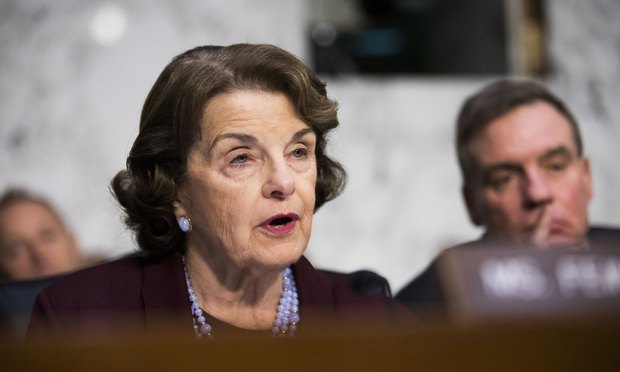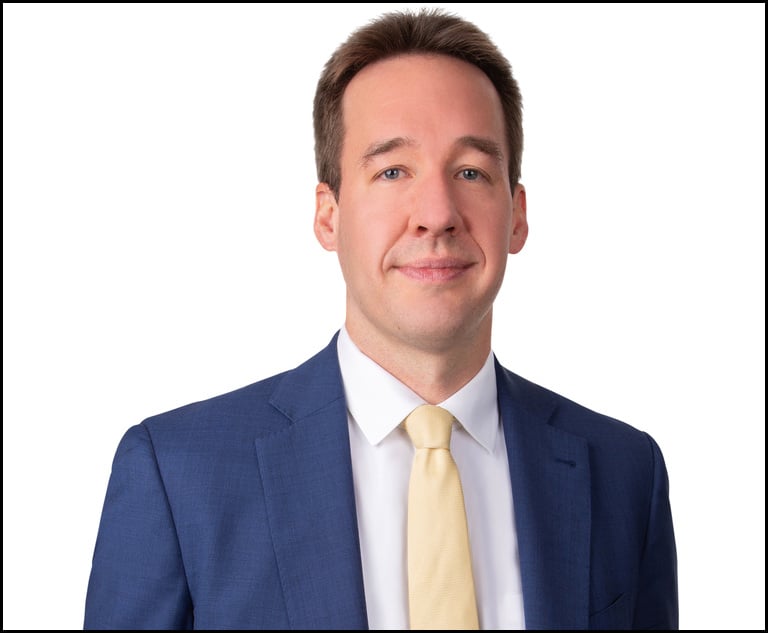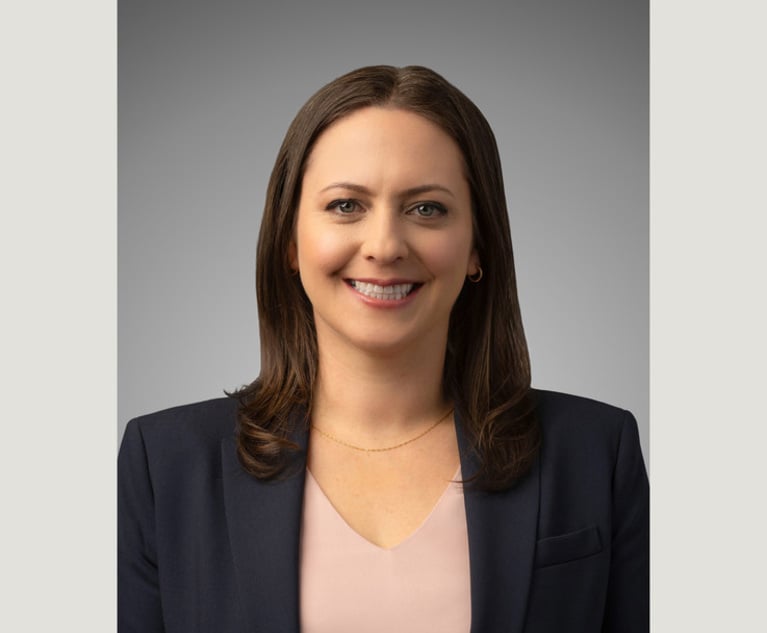Jeff Rosen Says His Kirkland Leadership Role Will Help Him as DOJ's No. 2
Rosen, the Trump administration's deputy attorney general nominee, formerly was a co-head of Kirkland's Washington office and a member of the firm's global executive management committee.
April 10, 2019 at 02:41 PM
6 minute read
 Jeffrey Rosen testifies before the Senate Judiciary Committee during his confirmation hearing to be deputy attorney general at the U.S. Department of Justice on April 10, 2019. (Photo: Diego M. Radzinschi/ALM)
Jeffrey Rosen testifies before the Senate Judiciary Committee during his confirmation hearing to be deputy attorney general at the U.S. Department of Justice on April 10, 2019. (Photo: Diego M. Radzinschi/ALM)
Jeffrey Rosen, the Trump administration's nominee for deputy U.S. attorney general, defended himself Wednesday against criticism that he lacked Justice Department experience and any background overseeing criminal cases, telling U.S. senators he would rely on guidance from seasoned federal prosecutors and draw from his past leadership role at a major law firm.
Saying he would not be the first deputy attorney general to be “confronted with that circumstance,” Rosen vowed to surround himself with some of the “thousands of seasoned and experienced and highly capable prosecutors” at the Justice Department.
The former Kirkland & Ellis partner, who has served since 2017 as deputy transportation secretary, sought from the outset of his confirmation hearing Wednesday to address the perceived shortcomings in his professional background.
“There have been 37 deputy attorneys general thus far, some who had served as federal prosecutors at the department, some who had served in legal roles at other departments and some who had worked primarily in private law firms,” Rosen said in his opening remarks. “I fall in the latter two categories so, if confirmed, would expect to draw fully on the extraordinary lawyers with prosecutorial experience at the department, including some in what would be my immediate office, as well as throughout the Department of Justice.”
Rosen would assume an office that has come under an intensified glare. In nearly two years as the Justice Department's second-in-charge, Rod Rosenstein, the departing deputy attorney general, held an outsize profile as the official overseeing special counsel Robert Mueller III's investigation into Russian interference in the 2016 election. Rosenstein appointed Mueller to run the investigation after then-Attorney General Jeff Sessions recused himself.
U.S. Sen. Richard Blumenthal, a Connecticut Democrat who previously served as the state's attorney general, asked whether Rosen would commit to protecting the U.S. attorney's office in Manhattan, which is investigating Trump's orbit in connection with hush payments that were made to two women who claimed to have had affairs with the now-president.
“You've never served as a prosecutor; you have no background in the Department of Justice. You're going to be engaged in on-the-job training. Without any disrespect, you have no credibility as a prosecutor or as a law enforcement official,” Blumenthal said. “So what I think we need from you is an unequivocal commitment that you will protect those offices from any interference.”
Rosen, who'd said earlier that investigations and prosecutions should be “free of improper political influences,” told Blumenthal: “I will differ with you in that I believe I would bring credibility to this position.”
Rosenstein's role made him a frequent target of Trump, who has regularly criticized the Mueller investigation and lawyers at the Justice Department. In public remarks, Rosenstein has appeared to yearn for the days in which the deputy attorney general came with celebrity inside the beltway but an otherwise low profile.
Rosen comes from a different mold than Rosenstein, who has been a career prosecutor for years. Rosenstein rose to the No. 2 slot from serving as U.S. attorney for Maryland across Republican and Democratic administrations. Sessions had been a U.S. attorney in Alabama before becoming a U.S. senator.
 Sen. Dianne Feinstein, D-California. (Photo: Diego M. Radzinschi/ALM)
Sen. Dianne Feinstein, D-California. (Photo: Diego M. Radzinschi/ALM)U.S. Sen. Dianne Feinstein, the Senate Judiciary Committee's ranking Democrat, pointed out that Barr and the head of the Justice Department's criminal division, former Kirkland & Ellis partner Brian Benczkowski, have also never served as prosecutors at the federal, state or local level.
Feinstein said Rosenstein had an “understanding of the practices and precedents that help ensure the independence of law enforcement. “My big concern is that, because Mr. Rosen has never before served as a prosecutor, he may not have that same intimate knowledge of those practices and those precedents.”
Republican senators highlighted Rosen's managerial experience and the responsibilities of the deputy attorney general, which extend beyond oversight of the department's criminal division and bolstering national security. Sen. John Cornyn, R-Texas, held up an organization chart showing the many and varied Justice Department divisions that report to the deputy attorney general.
Rosen said he surmised that Barr selected him for the No. 2 role because of his legal skills and background managing large federal agencies. The two worked together at Kirkland & Ellis and, when asked whether he had a “good working relationship” with Barr, Rosen replied, “Absolutely.”
Under questioning from Cornyn and the committee's chairman, Sen. Lindsey Graham of South Carolina, Rosen noted that he has overseen more than 55,000 employees at the Transportation Department.
Rosen formerly was a co-head of Kirkland's Washington office, and he previously served as a member of the firm's global executive management committee at a time, he said, when Kirkland had more than 1,000 lawyers. (Kirkland now reports a head count of more than 2,300 lawyers.)
Rosen had worked continually at Kirkland from 2009 to 2017, when he joined the Trump administration. He first made partner in 1988. Rosen reported on his newest financial disclosure receiving an annual Kirkland retirement payment of $192,705.
Cornyn asked whether the task of overseeing so many attorneys was “sort of like herding cats.”
“You don't have to answer that,” Cornyn said.
The exchange teed up a lawyer-joke from Graham: “That's a slam on cats.”
Read more:
Barr Eyes Ex-White House Lawyer for Top Justice Department Post
Women Lawyers' Group Stands Up for Jessie Liu After DOJ Nomination Scuttled
William Barr Fills Front Office With Trump White House Lawyers
Ex-Kirkland & Ellis Lawyers, Now at White House, Get Waivers
'Who Checks the Fact-Checker?' Meet Jeffrey Rosen, Trump's Deputy AG Pick
NOT FOR REPRINT
© 2025 ALM Global, LLC, All Rights Reserved. Request academic re-use from www.copyright.com. All other uses, submit a request to [email protected]. For more information visit Asset & Logo Licensing.
You Might Like
View All
Am Law 200 Firms Announce Wave of D.C. Hires in White-Collar, Antitrust, Litigation Practices
3 minute read
Veteran Federal Trade Law Enforcer Joins King & Spalding in Washington
4 minute read
Big Law Practice Leaders Gearing Up for State AG Litigation Under Trump
4 minute read
Weil Lures DOJ Antitrust Lawyer, As Government Lateral Moves Pick Up Before Inauguration Day
5 minute readTrending Stories
Who Got The Work
J. Brugh Lower of Gibbons has entered an appearance for industrial equipment supplier Devco Corporation in a pending trademark infringement lawsuit. The suit, accusing the defendant of selling knock-off Graco products, was filed Dec. 18 in New Jersey District Court by Rivkin Radler on behalf of Graco Inc. and Graco Minnesota. The case, assigned to U.S. District Judge Zahid N. Quraishi, is 3:24-cv-11294, Graco Inc. et al v. Devco Corporation.
Who Got The Work
Rebecca Maller-Stein and Kent A. Yalowitz of Arnold & Porter Kaye Scholer have entered their appearances for Hanaco Venture Capital and its executives, Lior Prosor and David Frankel, in a pending securities lawsuit. The action, filed on Dec. 24 in New York Southern District Court by Zell, Aron & Co. on behalf of Goldeneye Advisors, accuses the defendants of negligently and fraudulently managing the plaintiff's $1 million investment. The case, assigned to U.S. District Judge Vernon S. Broderick, is 1:24-cv-09918, Goldeneye Advisors, LLC v. Hanaco Venture Capital, Ltd. et al.
Who Got The Work
Attorneys from A&O Shearman has stepped in as defense counsel for Toronto-Dominion Bank and other defendants in a pending securities class action. The suit, filed Dec. 11 in New York Southern District Court by Bleichmar Fonti & Auld, accuses the defendants of concealing the bank's 'pervasive' deficiencies in regards to its compliance with the Bank Secrecy Act and the quality of its anti-money laundering controls. The case, assigned to U.S. District Judge Arun Subramanian, is 1:24-cv-09445, Gonzalez v. The Toronto-Dominion Bank et al.
Who Got The Work
Crown Castle International, a Pennsylvania company providing shared communications infrastructure, has turned to Luke D. Wolf of Gordon Rees Scully Mansukhani to fend off a pending breach-of-contract lawsuit. The court action, filed Nov. 25 in Michigan Eastern District Court by Hooper Hathaway PC on behalf of The Town Residences LLC, accuses Crown Castle of failing to transfer approximately $30,000 in utility payments from T-Mobile in breach of a roof-top lease and assignment agreement. The case, assigned to U.S. District Judge Susan K. Declercq, is 2:24-cv-13131, The Town Residences LLC v. T-Mobile US, Inc. et al.
Who Got The Work
Wilfred P. Coronato and Daniel M. Schwartz of McCarter & English have stepped in as defense counsel to Electrolux Home Products Inc. in a pending product liability lawsuit. The court action, filed Nov. 26 in New York Eastern District Court by Poulos Lopiccolo PC and Nagel Rice LLP on behalf of David Stern, alleges that the defendant's refrigerators’ drawers and shelving repeatedly break and fall apart within months after purchase. The case, assigned to U.S. District Judge Joan M. Azrack, is 2:24-cv-08204, Stern v. Electrolux Home Products, Inc.
Featured Firms
Law Offices of Gary Martin Hays & Associates, P.C.
(470) 294-1674
Law Offices of Mark E. Salomone
(857) 444-6468
Smith & Hassler
(713) 739-1250










